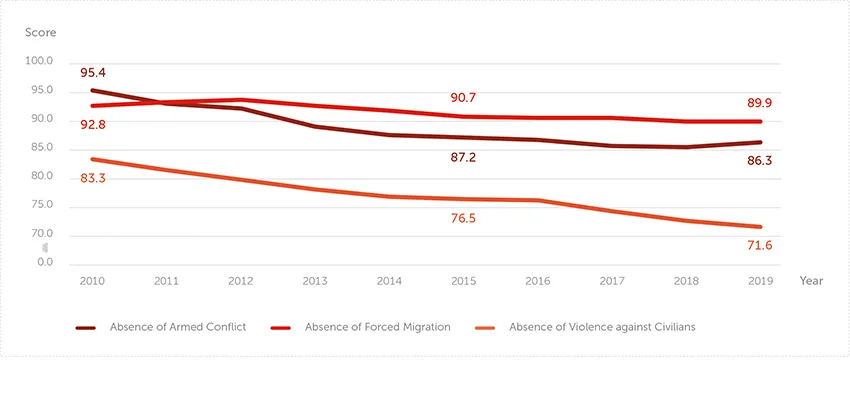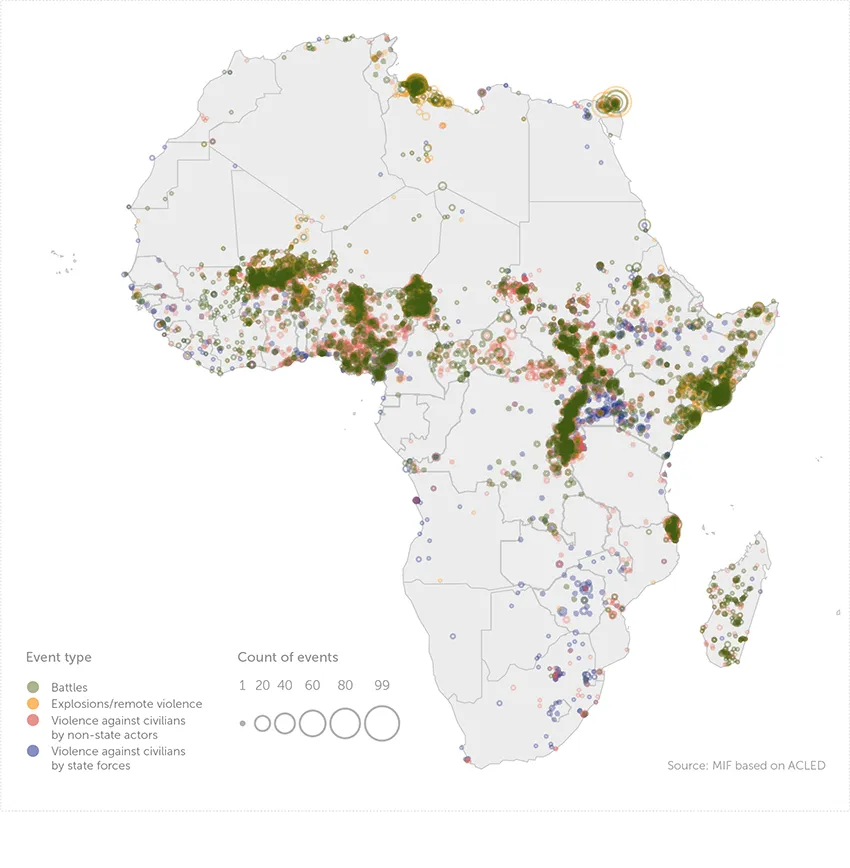COVID-19 has further complicated Africa’s road to 'Silencing the Guns'
29 September, 2021
By Ines Schultes, Senior Researcher
2020 was supposed to be the year all guns fell silent in Africa. A flagship project of the African Union’s Agenda 2063, 'Silencing the Guns' aims at “ending all wars, civil conflicts, gender-based violence, violent conflicts and preventing genocide”. The deadline for the project was set to 2020 with the AU making 'Silencing the Guns' its theme for that year. In November 2020, the AU gave itself another ten years to realise this ambitious goal.
Although COVID-19 was not the decisive factor in the failure to end violence on the continent, it has made Africa’s path to peace more complicated. As emphasised by Comfort Ero, Africa Programme Director at the International Crisis Group, during the 2021 Ibrahim Governance Weekend:
Even before COVID, conflict resolution on the continent has fared no better. In fact, there was conflict before the pandemic, and it will continue after the pandemic, because all the ingredients that give cause to these conflicts were there regardless of COVID.
COVID-19 has hampered conflict resolution efforts...
The start of COVID-19 interrupted conflict resolution and management efforts across the continent, including:
-
an extraordinary summit on ‘Silencing the Guns’ scheduled for May 2020 was postponed to December 2020, delaying discussions on the progress on the 2016 Master Roadmap of Practical Steps to Silence the Guns, and on ways to address crisis hotspots on the continent
-
resource reallocation towards the COVID-19 response led to reduced resources for small arms control, an essential element of the AU’s Silencing the Guns Roadmap
-
international or national engagements in counterinsurgency were scaled back, for example in the Lake Chad Basin and the Sahel
-
mediation, negotiation, and diplomatic efforts were postponed or moved into the virtual space
-
peace support operations had to delay deployment, limit their activities or downscale.
...but the security situation in Africa was on the decline long before the pandemic
Results from the 2020 Ibrahim Index of African Governance (IIAG) reveal that the security situation on the continent was in dire straits even before COVID-19 hit. The Security & Safety sub-category is the most declined of the 16 IIAG sub-categories at the continental level over the last decade (2010-2019). Armed conflict, violence against civilians and forced migration – three of the five indicators in the Safety & Security sub-category – have all worsened at the continental level over the past ten years.
Africa: selected Security & Safety indicators, average scores (2010-2019)

According to data from the Armed Conflict Location and Event Data Project (ACLED), levels of violence in Africa increased in 2020 compared to 2019, with the number of battles, explosions/remote violence and violent attacks against civilians all rising. Violence against civilians by state security forces was often connected to governments’ COVID-19 responses, with almost 20% of all such events between February 2020 and February 2021 being directly linked to the pandemic.
In August 2021 alone, the Uppsala Conflict Data Program counted almost 300 violent and deadly events across 22 African countries.
- Battles 2019-2020: +41.8%
- Violence against civilians by state forces 2019-2020: +39.0%
- Violence against civilians by non-state actors: +23.7%
- Explosions/remote violence 2019-2020: +14.6%
In most cases, violent events occurred in environments already experiencing long-term instability. Four of five countries worst affected by battle violence in 2020 (in order, with the most affected first: Somalia, DR Congo, Nigeria, Mali, Cameroon) have been among the worst-hit in the past years as well, Mali being the exception. DR Congo, Nigeria and Somalia have faced large battle violence and non-state actor violence against civilians over at least the past decade. The five worst-hit countries in 2020 regarding explosions/remote violence (in order, with the most affected first: Libya, Somalia, Egypt, Nigeria, Mali) have experienced high levels of this type of violence in previous years too.
African countries: battles, explosions/remote violence & violence against civilians events (2020)

Nigeria and Somalia are among the five worst hit countries in 2020 for battles, explosions/remote violence and violence against civilians, both by non-state actors and state forces.
The ongoing violence on the continent also has wider implications for the containment of COVID-19. The large and rising number of refugees and internally displaced persons are particularly vulnerable. Over 60 million people live in areas which are not controlled by government and run by non-state armed groups, where access to vaccinations might be lacking and where insecurity for healthcare workers is high.
To silence the guns, conflict prevention is key
Ending conflict on the continent will ultimately only be achieved through political solutions and these are currently insufficient. If Africa wants to realise the 'Silencing the Guns' initiative, it must put stronger efforts into conflict prevention and early-warning capacity. While the AU and the UN continue working to keep Africa on the agenda, the willingness of member states to act is key for effective crisis prevention and resolution.
Conflicts on the continent are often brewing long before erupting, but the link between early warning and early action is often weak. Africa needs comprehensive approaches to solve conflict; military solutions alone are not enough. Mobilising African resources for conflict prevention and resolution is key for the African Union and its member states, considering support from donors is in decline.


